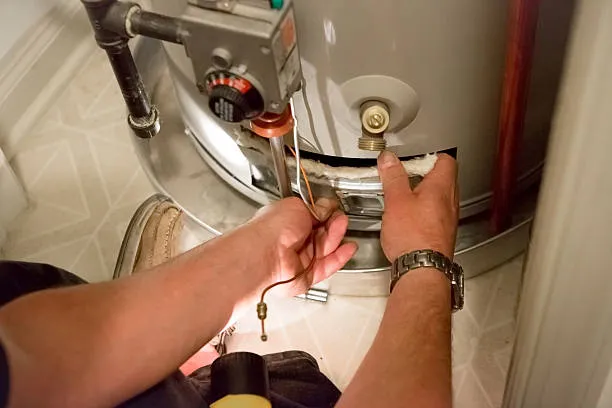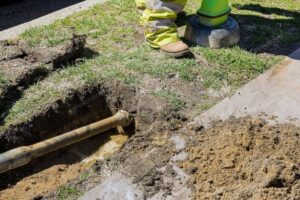Everything you should know about water heater replacement near me in July to avoid costly plumbing issues.
Let’s set the scene. It’s a hot July afternoon. You’ve got laundry running, dishes in the sink, and someone’s in the shower. Suddenly, they shout, “The water’s cold!”
Now you’re standing in front of your water heater, wondering what went wrong and whether this means it’s time for a full replacement. If you’re searching for “water heater replacement near me,” you’re likely dealing with a system that’s struggling to keep up, leaking, or simply not delivering the hot water your home needs.
The good news is that you’re not alone, and there’s a straightforward path to solving the problem without unnecessary stress or cold showers. This guide will walk you through everything you need to know to make a smart, confident decision about your water heater before you’re stuck in an emergency.
How Do You Know When It’s Time to Replace a Water Heater?
Most homeowners don’t think about their water heater until something goes wrong. The tricky part is, it doesn’t always break suddenly. More often, it declines slowly. If you know what to look for, you can catch it early. Here are some common warning signs:
- Water takes too long to heat or runs out quickly
- Inconsistent temperature or lukewarm water even on the hottest setting
- Rust-colored water from the tap, especially hot water
- Popping or rumbling noises from the tank
- Leaks or puddles around the base
- Unit is 8 or more years old
If any of these sound familiar, it might be time to replace a broken water heater, especially if your system is approaching the end of its expected lifespan. Traditional tank heaters usually last about 8 to 12 years with proper maintenance.
Common Causes of Water Heater Failure (That You Can’t Ignore)
What actually causes a water heater to stop working? One of the most common issues is sediment buildup. Over time, minerals from your water settle in the tank, especially if you live in an area with hard water. This sediment creates insulation between the heating element and the water, which makes it harder to heat efficiently.
Then, there’s corrosion. Water heaters are built with a part called an anode rod, which helps prevent rust inside the tank. But when that rod is used up and not replaced, the tank begins to corrode.
Other common causes include:
- A faulty thermostat or heating element
- A broken pressure relief valve
- Leaks in the tank, which often mean the whole unit needs to be replaced
These problems tend to snowball, especially if your water heater hasn’t been maintained regularly. Even small issues can turn into full-blown failure if left unaddressed.
Repair vs. Replace: When Is It Worth It?
We get this question a lot. “Can it be fixed, or should I just replace it?” Here’s a general rule. If the repair will cost more than 50 percent of a new unit, and your water heater is over 8 years old, replacement usually makes more sense.
Repairs might be worth it if:
- The issue is small, like a thermostat or valve.
- Your system is still fairly new, under 5 to 6 years old.
- There’s no sign of corrosion or major leaks.
If your heater is aging, struggling to keep up, or showing multiple issues, a new unit will be more reliable and efficient.
What Happens When You Install a New Water Heater?
If you’ve never replaced a water heater before, you might be wondering what the process looks like. The good news is that it’s typically a same-day job when handled by a professional plumber. Here’s how it usually goes:
- The old unit is drained and disconnected. The plumber turns off the power or gas, shuts off the water supply, and safely drains the tank.
- The old heater is removed and hauled away.
- The new water heater is installed and connected to power, gas or electric, and water lines.
- The system is tested to make sure everything heats correctly and works safely.
- The technician cleans up and gives you a quick walkthrough of the new unit.
From start to finish, this usually takes a few hours, depending on the setup and any access issues. A pro will also ensure that everything is up to code and working efficiently.
Choosing Between Tank and Tankless (and What’s Best for Your Home)
When it’s time to install a new water heater, one of the first decisions you’ll face is whether to go with a traditional tank model or a tankless system. Here’s a quick comparison:
Tank Water Heaters
- Lower initial cost
- Stores 30 to 80 gallons of hot water
- Heats continuously
- Shorter lifespan (8 to 12 years)
- Better for homes with consistent hot water use
Tankless Water Heaters
- Higher upfront cost
- Heats water on demand, so no standby heat loss
- Longer lifespan (15 to 20 years)
- More energy efficient
- Best for smaller households or people who want unlimited hot water
The right option depends on your household’s size, water usage habits, and budget. Some homeowners prefer the reliability of a tank system. Others like the long-term efficiency of tankless models.

The Hidden Costs of Waiting Too Long to Replace Your Water Heater
One of the most common plumbing emergencies we see happens when a homeowner waits too long to replace a water heater. A leaking or burst tank can cause:
- Flooding in garages, closets, or hallways
- Damage to flooring, drywall, and baseboards
- Mold growthif not dried quickly
- Emergency plumbing fees
- Downtime without hot water when you least expect it
Even if your water heater hasn’t failed completely, an old or failing unit can quietly raise your utility bills by working overtime to do the same job. Replacing before the crisis helps you stay in control of the cost, the timing, and the type of system you choose.
Why “Water Heater Replacement Near Me” Shouldn’t Mean “Anyone With a Wrench”
Let’s be honest. When your water heater goes out, the temptation is to search for the first available help and call whoever can get there fastest. However, choosing just anyone with a wrench isn’t always the best move.
Water heater replacement involves working with high-pressure plumbing lines, electricity or gas, and strict safety codes. A poorly installed water heater isn’t just inefficient. It can be dangerous and even void your warranty or home insurance coverage. Here’s what you should expect from a qualified plumber:
- Licensed and insured
- Familiar with local codes
- Experienced in both tank and tankless systems
- Provides clear, up-front pricing
- Has good local reviews and customer support
Choosing a professional means your installation will be done right the first time, giving you peace of mind and better performance over the long run.
Conclusion
Your water heater is one of the hardest-working systems in your home. It heats water all day long for showers, laundry, dishes, and more. When it fails, it can bring your daily routine to a halt. If your system is old, unreliable, or showing warning signs, don’t put off replacement until it’s an emergency. A quick check now could save you thousands later.
Whether you’re ready to install new water heater or want to figure out if it’s time to replace broken water heater, we are here to help. We offer honest advice, fast service, and expert installation that gets the job done right.
Visit Smelscer Plumbingto schedule an appointment today, and we’ll make sure your hot water stays hot, all year long.




